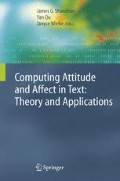Abstract
In addition to factual content, many texts contain an emotional dimension. This emotive, or affect, dimension has not received a great amount of attention in computational linguistics until recently. However, now that messages (including spam) have become more prevalent than edited texts (such as newswire), recognizing this emotive dimension of written text is becoming more important. One resource needed for identifying affect in text is a lexicon of words with emotion-conveying potential. Starting from an existing affect lexicon and lexical patterns that invoke affect, we gathered a large quantity of text to measure the coverage of our existing lexicon. This chapter reports on our methods for identifying new candidate affect words and on our evaluation of our current affect lexicons. We describe how our affect lexicon can be extended based on results from these experiments.
This work was done while the first author was an employee of Clairvoyance Corporation.
Access this chapter
Tax calculation will be finalised at checkout
Purchases are for personal use only
Preview
Unable to display preview. Download preview PDF.
7. Bibliography
Brave, S. and Nass, C. (2002) Emotion in human-computer interaction. In Jacko, J. and Sears, A. (Eds.) The Human-Computer Interaction Handbook: Fundamentals, Evolving Technologies and Emerging Applications. Lawrence Erlbaum Associates, Inc., Mahwah, NJ.
Berlin, B. and Kay, P. (1969) Basic color terms: their universality and evolution. University of California Press, Berkeley.
Church, K. W. and Hanks, P. (1989) Word association norms, mutual information and lexicography. In Proceedings of the 27th Annual Conference of the Association of Computational Linguistics. 76–82.
Deese, J. (1964) The Associative Structure of some Common English Adjectives. Journal of Verbal Learning and Verbal Behavior 3(5). 347–357.
Hatzivassiloglou, V. and McKeown, K. R. (1993) Towards the automatic identification of adjectival scales: Clustering adjectives according to meaning. In Proceedings of 31st Annual Meeting of the Association for Computational Linguistics. 172–182.
Hatzivassiloglou, V. and McKeown, K. R. (1997) Predicting the semantic orientation of adjectives. In Proceedings 35th Annual Meeting of the Association for Computational Linguistics. 174–181.
Hindle, D. (1990) Noun classification from predicate argument structures. In Proceedings of the 28th Annual Meeting of the Association for Computational Linguistics. 268–275.
Horn, L. (1969) A Presuppositional Analysis of Only and Even. In Papers from the 5th Regional Meeting of the Chicago Linguistics Society. 98–107.
Huettner, A. and Subasic, P. (2000) Fuzzy Typing for Document Management. In ACL 2000 Software Demonstration.
Lasswell, H. D. and Namenwirth, J. Z. (1969) The Lasswell Value Dictionary. Yale University Press, New Haven.
Lehrer, A. (1974) Semantic Fields and Lexical Structure. North Holland, London.
Levinson, S. C. (1983) Pragmatics. Cambridge University Press, Cambridge, UK.
Stone, P. J., Dunphy, D. C., Smith, M. S., and Ogilvie, D. M. (1966) The General Inquirer: A Computer Approach to Content Analysis. MIT Press, Cambridge, MA.
Subasic, P. and Huettner, A. (2000a) Affect Analysis of Text Using Fuzzy Semantic Typing. In Proceedings of FUZZ-IEEE 2000.
Subasic, P. and Huettner, A. (2000b) Calculus of Fuzzy Semantic Typing for Qualitative Analysis of Text. In Proceedings of ACM KDD 2000 Workshop on Text Mining.
Subasic, P. and Huettner, A. (2001) Affect Analysis of Text Using Fuzzy Semantic Typing. IEEE Transactions on Fuzzy Systems, Special Issue.
Teufel, S. and Moens, M. (2002) Summarizing Scientific Articles — Experiments with Relevance and Rhetorical Status. Computational Linguistics, 28(4).
Turney, P. D. (2001) Mining the Web for Synonyms: PMI-IR versus LSA on TOEFL. In Proceedings of the Twelfth European Conference on Machine Learning (ECML2001). 491–502.
Turney, P. D. and Littman, M. L. (2003) Measuring praise and criticism: Inference of semantic orientation from association. ACM Transactions on Information Systems (TOIS), 21(4), 315–346.
Wiebe, J. (2000) Learning subjective adjectives from corpora. In Proceedings of AAAI 2000. 735–740.
Author information
Authors and Affiliations
Editor information
Editors and Affiliations
Rights and permissions
Copyright information
© 2006 Springer
About this chapter
Cite this chapter
Grefenstette, G., Qu, Y., Evans, D.A., Shanahan, J.G. (2006). Validating the Coverage of Lexical Resources for Affect Analysis and Automatically Classifying New Words along Semantic Axes. In: Shanahan, J.G., Qu, Y., Wiebe, J. (eds) Computing Attitude and Affect in Text: Theory and Applications. The Information Retrieval Series, vol 20. Springer, Dordrecht. https://doi.org/10.1007/1-4020-4102-0_9
Download citation
DOI: https://doi.org/10.1007/1-4020-4102-0_9
Publisher Name: Springer, Dordrecht
Print ISBN: 978-1-4020-4026-9
Online ISBN: 978-1-4020-4102-0
eBook Packages: Computer ScienceComputer Science (R0)

